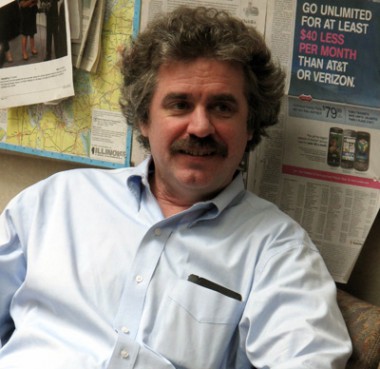
(RNS1-AUG18) Mark Jacob is co-author, with his brother Matthew, of the new book, “What the Great Ate.” For use with RNS-10-MINUTES, transmitted Aug. 18, 2010. RNS photo courtesy Random House.
(RNS) Pope Clement VII was a connoisseur of mustard, Pope Martin VI had a taste for pickled eels, St. Rose of Lima’s devotional practices strayed into bulimia and the fish that Jesus used to feed the 5,000 was likely tilapia.
It’s the kind of culinary minutiae contained in brothers Matthew Jacob and Mark Jacob’s new book, “What the Great Ate: A Curious History of Food & Fame,” which details the gastronomic tendencies of kings, poets, artists and presidents.
One chapter, “Soul Food,” provides all the meaty details and dietary quirks of the spiritually inclined. Mark Jacob, who wrote that chapter, discusses food, inspiration, and quirkiness among the religious figures of history. Some answers have been edited for length and clarity.
Q: Where did the inspiration for this book come from?
A: Matthew is something of a foody, and we’re both fans of historical trivia. We just love obscure historical facts, and we love sharing them. And so we batted around the idea for a few months and came up with this idea.
Q: What was your favorite story about a religious person?
A: I liked the story of Moses leading his people out of the desert all the while eating only manna. The idea that they ate this for 40 years and they started grumbling is one of those stories from the Bible that demonstrates how fickle people can be, and how they become impatient. Maybe it tells us we should be satisfied with our food.
Q: How did your upbringing influence the piece?
A: I was raised Catholic, but didn’t extensively study the Bible as a young person. But when I was trying to research the food in the Bible, it was fascinating.
I was most amazed by what the Catholic (Eucharistic) host was like. According to one source, the host was large and hollow in the middle, like a wreath, and people would take a piece. It was really quite far into the history of Christianity that individual hosts came into play. I didn’t know the history; being raised Roman Catholic, you would think I would have known that.
Q: Have you thought about writing a whole book just on food and religion?
A: We’ve talked about it. All the dietary restrictions that take place and where they come from are interesting. We could’ve written an awful lot more on kosher foods and where these kosher dietary restrictions came from. And a complete book could be written on religious fasting alone.
Q: What was your favorite story about dietary restrictions?
A: Gandhi. He promised his mother that he would not drink milk, but felt compelled to because he said he lost his good health when he didn’t. So he believed that drinking goat’s milk was within the letter of the law.
He was so adamant that he wouldn’t drink cow’s milk that when he was imprisoned, he would have a goat brought into his jail cell and see that it was milked in front of him to ensure that it was not cow’s milk. People will go to great lengths to follow the dietary rules that they choose.
Q: Where do you get the details from?
A: It required a lot of work and a lot of time to get a small amount of facts. We read biographies voraciously. We would go to the library and check out stacks of books. It’s very unlikely that you’ll find a reference to food in the index of a biography. We would speed read the whole book and find a reference to the fact that that person liked bacon, for instance.
Q: Why did you write the “Soul Food” chapter?
A: Out of the 12 chapters, we each picked six that we wanted to work on. I am not personally very religious, but I’m fascinated by religion. And religion and philosophy tend to reflect people’s goals and aspirations. The way people behave religiously may not reflect perfect behavior, but it may reflect their goals about what perfection is and how they would like to behave.
Q: What did you learn about religion while writing this chapter?
A: I found all religions interesting and how all sorts of people, from Confucius to Martin Luther King, were trying to find the truth.




